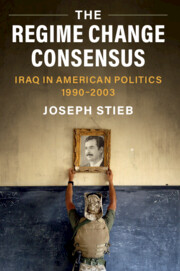Book contents
- The Regime Change Consensus
- Military, War, and Society in Modern American History
- The Regime Change Consensus
- Copyright page
- Dedication
- Contents
- Acknowledgments
- Abbreviations
- Introduction
- 1 A Hope, Not a Policy
- 2 The Fallout from Victory: Containment and Its Critics, 1991–1992
- 3 The Long Watch: The High Years of Containment, 1993–1996
- 4 Saddam Must Go: Entrenching the Regime Change Consensus, 1997–2000
- 5 Not Whether, but How and When: The Iraq Debate from 9/11 to the Invasion
- Conclusion
- Bibliography
- Index
2 - The Fallout from Victory: Containment and Its Critics, 1991–1992
Published online by Cambridge University Press: 18 June 2021
- The Regime Change Consensus
- Military, War, and Society in Modern American History
- The Regime Change Consensus
- Copyright page
- Dedication
- Contents
- Acknowledgments
- Abbreviations
- Introduction
- 1 A Hope, Not a Policy
- 2 The Fallout from Victory: Containment and Its Critics, 1991–1992
- 3 The Long Watch: The High Years of Containment, 1993–1996
- 4 Saddam Must Go: Entrenching the Regime Change Consensus, 1997–2000
- 5 Not Whether, but How and When: The Iraq Debate from 9/11 to the Invasion
- Conclusion
- Bibliography
- Index
Summary
This chapter shows how the United States and its allies established a containment regime on Iraq after the Gulf War in the hope of using sanctions to compel Saddam to cooperate with UN weapons inspections. This chapter argues that despite the military victory in the Gulf War, a political narrative emerged in 1991 that Bush had missed several opportunities to overthrow Saddam and abandoned rebels who rose up against the Iraqi government, making the Gulf War a flawed victory. As Saddam obstructed inspections and challenged containment over the next two years, Democrats and neoconservatives developed the argument that containment could not address the Iraqi threat because it did not target the Iraqi regime, the source of its misbehavior, for removal. Containment thus became the US policy toward Iraq in an atmosphere of disappointment and recrimination that created a political bias against restrained approaches to Iraq and in favor of the more immediate pursuit of regime change.
Keywords
- Type
- Chapter
- Information
- The Regime Change ConsensusIraq in American Politics, 1990-2003, pp. 54 - 97Publisher: Cambridge University PressPrint publication year: 2021



